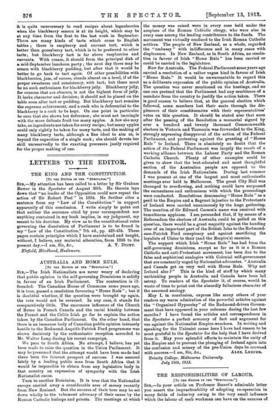AUSTRALIA AND HOME RULE.
[To THE EDITOR OF THE " SPECTATOR."1 SIR,—The Irish Nationalists are never weary of declaring that public opinion in the self-governing Dominions is solidly in favour of an Irish Parliament. The contention is ill- founded. The Canadian House of Commons some years ago, it is true, passed a resolution favouring "Home Rule"; but it is doubtful whether, if the question were brought up again, the vote would not be reversed. In any case, it stands for comparatively little. The enormous influence of the Church of Rome in French Canada and the racial kinship between the French and the Celtic Irish go far to explain the action taken by the Canadian Parliament. On the other hand, that there is an immense body of Canadian public opinion intensely hostile to the Redmond-Asquith-Patrick Ford programme was shown decisively by the enthusiastic reception accorded to Mr. Walter Long during his recent campaign.
We pass to South Africa. No attempt, I believe, has yet been made to raise the question in the Union Parliament. It may be presumed that the attempt would have been made had there been the faintest prospect of success. I was assured lately by a leading public man from South Africa that it would be impossible to obtain from any legislative body in that country an expression of sympathy with the Irish Nationalist cause.
Turn to another Dominion. It is true that the Nationalist envoys carried away a considerable sum of money recently from New Zealand. But the success of their tour may be set down wholly to the vehement advocacy of their cause by the Roman Catholic bishops and priests. The meetings at which the money was raised were in every case held under the auspices of the Roman Catholic clergy, who were also in every case among the leading contributors to the funds. The movement was virtually confined to the Irish Roman Catholic settlers. The people of New Zealand, as a whole, regarded the "embassy" with indifference and in many cases with displeasure. In New Zealand, as in South Africa, no resolu- tion in favour of Irish "Home Rule" has been carried or could be carried in the legislature.
Now for Australia. The Federal Parliament some years ago carried a resolution of a rather vague kind in favour of Irish "Home Rule." It would be unwarrantable to regard this as a deliberate expression of the public opinion of Australia. The question was never mentioned on the hustings, and no one can pretend that the Parliament had any semblance of a mandate from the country to justify the action taken. There is good reason to believe that, at the general election which followed, some members lost their seats through the dis- pleasure of their constituencies with their representatives' votes on this question. It should be stated also that soon after the passing of the Resolution a memorial signed by over a hundred and twenty thousand Commonwealth electors in Victoria and Tasmania was forwarded to the King, strongly expressing disapproval of the action of the Federal Parliament, and protesting against the granting of "Home Rule" to Ireland. There is absolutely no doubt that the action of the Federal Parliament was largely the result of a working alliance between the Labour Party and the Roman Catholic Church. Plenty of other examples could be given to show that the best-educated and most thoughtful section of the Australian people are opposed to the demands of the Irish Nationalists. During last summer I was present at one of the largest and most enthusiastic: meetings ever held in Melbourne. The great City Hall was thronged to overflowing, and nothing could have surpassed the earnestness and enthusiasm with which the proceedings were conducted. Resolutions denouncing "Home Rule" as a peril to the Empire and a flagrant injustice to the Protestants of Ireland were carried unanimously by the huge gathering. The mention of Sir Edward Carson's name was received with tumultuous applause. I am persuaded that, if by means of a Referendum the electors of Australia could be polled on. this question, there would be a great majority against the handing over of an important part of the British Isles to the Red mond- cum-Patrick Ford conspiracy and against sacrificing the loyalists of Ulster to their (and the Empire's) enemies.
The support which Irish "Home Rule" has had from the self-governing dominions, except so far as it is a Roman Catholic and anti-Protestant movement, has been due to the false and sophistical analogies with Colonial self-government that are constantly urged by Nationalist advocates. "Australia and Canada get on very well with Home Rule. Why not Ireland also ?" This is the kind of stuff by which many unthinking people in Australia and Canada have been led astray. To readers of the Spectator it, of course, would be waste of time to point out the absurdly fallacious character of the assumed analogy.
May I, in conclusion, express like many others of your readers my warm admiration of the powerful articles against the "Organized Hypocrisy" of the Redmond-driven Govern- ment that have appeared in your columns during the last few months ? I have found the articles and correspondence in the Spectator a perfect armoury of fact and argument for use against the Nationalist Empire-wreckers. In writing and speaking for the Unionist cause here I have had reason to be most grateful to the Spectator for the help that I have derived from it. May your splendid efforts to maintain the unity of the Empire and to prevent the plunging of Ireland again into the confusion and misery of the pre-Union days be crowned










































 Previous page
Previous page